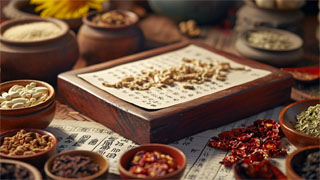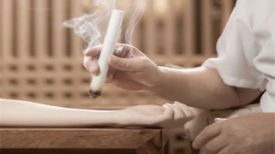
1. It is always said that "Treatise on Cold Damage" is truly a treasure. From Guizhi Tang to Gegen Tang, Xiaoqinglong Tang, Xiaochaihu Tang, Zhang Zhongjing has prescribed countless famous prescriptions for diseases such as Taiyang, Shaoyang, and Taiyin, and it is still the standard of prescriptions to this day.
So, the book "Treatise on Cold Damage" laid the foundation for dialectical treatment and proposed a dialectical program and treatment methods for the diagnosis and treatment of exogenous diseases.
There are only two prescriptions in the entire book "Treatise on Cold Damage" to treat internal deficiency. There are two types of internal deficiency: one is abdominal pain, which is Xiaojian Zhongtang; Another type is roasted licorice soup.
Today we are going to talk about the roasted licorice soup in the Treatise on Cold Damage. The original text states that typhoid fever, pulse congestion, palpitations, and roasted licorice soup are the main ingredients.
What is palpitations? It's just palpitations, anxieties, and a desire to cry.
Maijie Dai, also known as "arrhythmia" in Western medicine, refers to the irregular stopping of the pulse after two or three beats, or after a few or more beats.
Knots are like tying many knots on a rope, the distance between the knots is not certain, and when touched by the hand, it becomes a vein. The pulse is like a drop of water, which only drips a drop after a long time. Both vein formation and pulse formation are symptoms, and once the pulse is formed, it becomes roasted licorice soup. About three doses will be enough.
Why does it have a complex pulse structure?
People with gastrointestinal deficiency are more likely to see it, while those with gastrointestinal deficiency have poor digestion, so they often see it on women, thinking that it can damage the spleen and cause it to swell.
After eating food, there are intervals due to the slow peristalsis of the small intestine (heart and small intestine). After the food is absorbed by the human stomach, it becomes blood, which is then supplied to the heart.
If blood is sometimes given and sometimes not given, sometimes the heart can catch blood, and sometimes it can't, then stop for a while, so people with deficiency will have a phenomenon of pulse blockage.
Zhang Zhongjing discovered that this arrhythmia was caused by the gastrointestinal tract, which can be seen when there is insufficient body fluid in the stomach.
Because it is known that it is due to gastrointestinal deficiency, the prescription uses licorice, ginseng, jujube, and ginger. These four medicines are fixed.
The spleen itself has kinetic energy, squeezing out the blood from the spleen to the main meridian of the spleen, which is the pancreas. The blood vessels of the pancreas reach below the stomach, and the stomach receives blood and heat from the spleen, causing it to start peristalsis.
If the heat is not enough and the peristalsis is gone, the heat that originally existed in the stomach will move upwards, which is originally in the body fluid of the stomach.
Because the dryness in the stomach rises, the lungs will also follow suit, so the mood will be bad. The lungs and large intestine are on the same surface, so it is known that this person's stool will definitely not be good.
It's not constipation, but bowel movements are not very good. It's important to have a lower burning stool, and the upper source must be moist. Otherwise, the lungs will be too hot and there will be no bowel movements later on. Therefore, adding Maimendong is specifically designed to moisten the lungs and ensure sufficient humidity.
Then add Mazi Ren, because he is not constipated and has food in his intestines. Although his intestines are moving, they are walking too slowly.
If using rhubarb and mirabilite is too strong, slowly clear the intestines with sesame seeds. Chinese medicine's kernel agents, such as almonds and plums, are oily and can lubricate.
The blood is not enough originally. The extra raw ground, ass hide glue, is specially used to replenish blood. At this point, relying solely on licorice, ginseng, jujube, and ginger, and eating food to supplement it is too slow.
So add the blood tonifying medicine inside and let it enter the heart, so reuse the cinnamon twig. These nine herbs combined are called roasted licorice soup, which uses roasted licorice to strengthen the chest yang.
3. Recipe of roasted licorice: four liang of roasted licorice, three liang of ginger, three liang of cinnamon twigs, two liang of ginseng, one jin of raw rehmannia glutinosa, two liang of ass hide glue, half liter of asparagus, half liter of sesame seeds, and thirty pieces of jujube.
Nine flavors are added, with seven liters of sake and eight liters of water. First, boil the eight flavors, take three liters, remove the dregs, add the glue, and close to dissipate. Take one liter warm and take three servings a day. A compound pulse soup.
The current prescription can refer to the following:
12g of roasted liquorice, 9g of ginger, 9g of cinnamon twig, 6g of ginseng, 50g of raw rehmannia glutinosa, 6g of ass hide glue, 10g of asparagus, 10g of hemp seed, and 10 pieces of jujube.
For the above eight ingredients (except ass hide glue), 800ml of water is added, 700ml of yellow rice wine or sake is added, the first eight ingredients are boiled first, then the dregs are removed and poured out, and ass hide glue is dissolved into the liquid medicine, and taken warm in 2-3 times.
Ass hide glue is used raw. When it is used raw, the medicine is sharp and fast. The boiled medicine is pure but slow. When it is used raw, ass hide glue can go to the heart immediately, and the blood will be replenished immediately.
Because I knew the patient's body was weak, I used one or two raw materials.
Maimen Dong and Mazi Ren are both external and internal medicines, one for moistening the lungs and the other for clearing the intestines, so they are often used together in equal amounts. Sake, white wine, and rice wine are enough.
In the 30th chapter of the Inner Canon, Lingshu, it is mentioned that:
What is Jin?
Qi Bo said, "When the meridians are released and sweat is shed, it is called Jin.".
What is liquid?
Qi Bo said, "When grain enters, Qi fills the swamp and is infused into the bones. The bones belong to the category of bending, stretching, and releasing fluids, which nourish the brain and marrow, and nourish the skin. This is called fluid.".
If we divide yin and yang based on the two factors of body fluid, then body fluid is yang and fluid is yin. When there is a shortage of nutrients, we use ginseng to supplement it; If the liquid is insufficient, we use raw land to replenish it.
From this, we can know the pharmacological effects of using ginseng and raw materials in roasted licorice soup.
The original prescription of "Fangyu Fen" states: "This is a holy prescription for Zhongjing typhoid fever, with congested meridians and palpitations."; Sun Zhenren used it to treat deficiency and fatigue, and Wang Ci began to use it to promote lung dysfunction. This is how all the prescriptions of Zhongjing were transformed.
Therefore, although Yuntong changes like this, the beauty of this formula lies in the formation of meridians, hence it is also known as Fumai Tang. No matter what kind of disease, anyone who has a complex pulse should use this prescription first.
The content of the article is for clinical reference only. Non professionals in traditional Chinese medicine are not allowed to try medication.


